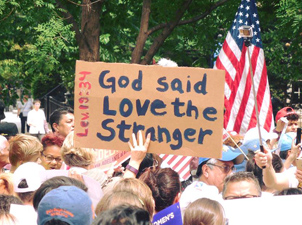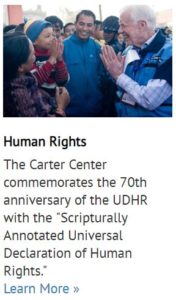
A Faithful Reflection on the Universal Declaration of Human Rights
Colleen Ross
December 11, 2018
On December 10, 1948, the Universal Declaration of Human Rights (UDHR) was adopted by the UN General Assembly. To mark the 70th anniversary of this event, the Carter Center, founded by U.S. President Jimmy Carter, published a new compilation of Biblical texts that support the human rights proclaimed in the groundbreaking United Nations document. Sister Simone Campbell contributed, along with 14 other faith leaders, to the final document titled, “Scripturally Annotated Universal Declaration of Human Rights.”
Religious texts have been used against marginalized communities for too long. To counter this, we must declare the truth of religious teachings that liberate all of God’s creation. At an event launching this document, President Jimmy Carter said: “One of the main reasons for inequality and oppression of women is that the primary translators of religious scriptures were men.”
When the Universal Declaration of Human Rights was published in 1948, it was a direct response to the horrors and sins of the Holocaust and the Second World War. Now, this new pairing of scripture and human rights is important in our current time, when both religious texts and legal particulars are used to avoid fulfilling the responsibilities we have to our sisters and brothers who are suffering and vulnerable in our nation and around the world.
About the connection between Article 25 of the UDHR and the parable of the Good Samaritan, Sister Simone writes:
This story of the Good Samaritan outlines the basic call to care for our neighbors. Jesus says that the Samaritan (an outcast in Judaism at the time) took the man who had been attacked by the side of the road and took extravagant effort to ensure that he was housed, fed, and received healthcare.
UDHR Article 25, in a sense, extends the compassion evidenced by the Good Samaritan and posits a set of basic rights around human well-being: food, clothes, housing, health care, social security. The special needs of mothers and children (note the specific concern for children born out of wedlock) receive special focus here, as also in the Bible. Each person and family is entitled to the basics of life, with special attention to times and cases of special vulnerability, so that each can live in dignity.
Many more parallels can be drawn between Christian religious teachings and these universally declared human rights. May all of us, and especially our political leaders, be inspired by faith or civic responsibilities to ensure that all people can fully claim these inalienable human rights.
Read the full document on the Carter Center’s website.








